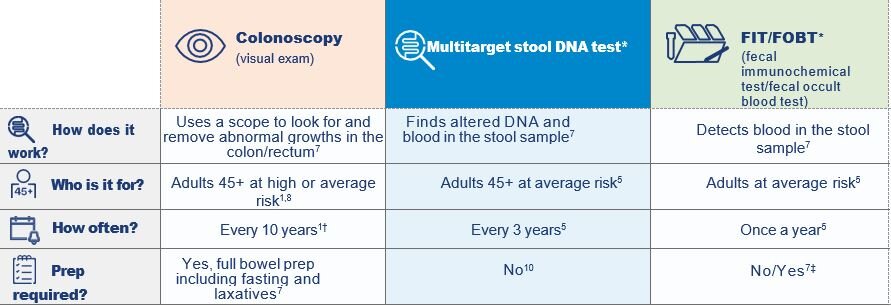
Colorectal Cancer Awareness Month Facts
Fast Facts for Colorectal Cancer
We get it, it’s hard to talk about butt stuff – especially with your doctor. But this Colorectal Cancer Awareness Month, it’s important to discuss your risks of colon cancer, what to do to prevent it, and how to speak with a gastroenterologist about your GI concerns.
What is colorectal cancer?
Colorectal Cancer, sometimes shortened to colon cancer, is a type of cancer caused by cell overgrowth in the colon or rectum. These abnormal growths are called polyps. If polyps are not removed, they can become cancerous and spread to other organs in the body. Colorectal cancer is the 4th most common cancer and the 3rd leading cause of cancer deaths for both men and women[i].
Who is at risk?
Age is one of the most important risk factors for colorectal cancer, with colon cancer rates increasing with age. Nearly 94% of new cases of colorectal cancer occur in adults 45 years or older.[ii] Additionally, people with a family history and other personal risk factors (such as obesity, diabetes, long-term smoking, or alcohol use) also see a higher risk of colorectal cancer.[iii]
How do you screen for colorectal cancer?
Screening tests can find polyps so they can be removed before turning into cancer. Colorectal screening also helps find colorectal cancer at an early stage, when treatment works best. At Crystal Run Healthcare, we provide three types of screening options for colorectal cancer:

Please note that all positive results on non-colonoscopy screening tests should be followed up with a timely colonoscopy. Crystal Run Healthcare gastroenterologists offer colonoscopy screening in several locations including three onsite Endoscopy Suites in Newburgh, Rock Hill, and West Nyack, and our advanced Ambulatory Surgery Center in Middletown, NY.
What age is the screening recommended?
Colorectal cancer rates are increasingly found at younger ages. That is why the new guideline suggests that anyone turning 45 schedules a colonoscopy to screen for colon cancer or any growing polyps.[iv] It is also recommended to schedule a colonoscopy every 10 years. If you choose another type of screening, it is important to follow testing guidelines for each as some of them require more frequent screenings.
Who do I go to with colon cancer concerns?
Gastroenterologists at Crystal Run Healthcare are ready to help you with your GI needs. Whether it’s discovering the source of an upset stomach, colonoscopies, or scheduling an endoscopy procedure at our state-of-the-art Ambulatory Surgery Center, our GI doctors deliver a multi-specialty approach to your health care. Schedule an appointment today.
[ii] https://www.uspreventiveservicestaskforce.org/uspstf/recommendation/colorectal-cancer-screening#citation2
[iii] https://www.uspreventiveservicestaskforce.org/uspstf/recommendation/colorectal-cancer-screening#citation9
[iv] https://www.cdc.gov/cancer/colorectal/statistics/use-screening-tests-BRFSS.htm
Colorectal Cancer Shared Decision-Making Chart References:
†For adults at high risk, testing may be more frequent and should be discussed with your healthcare provider.12‡FIT does not require changes to diet or medication. FOBT requires changes to diet or medication.7
1. ACS. Can Colorectal Polyps and Cancer Be Found Early? Updated June 29, 2020. Accessed June 20, 2023. https://www.cancer.org/cancer/types/colon-rectal-cancer/detection-diagnosis-staging/detection.html 2. CDC. What Can I Do to Reduce My Risk of Colorectal Cancer? Updated February 23, 2023. Accessed June 20, 2023. https://www.cdc.gov/cancer/colorectal/basic_info/prevention.htm 3. Henley SJ, Ward EM, Scott S, et al. Annual report to the nation on the status of cancer, part I: national cancer statistics. Cancer. 2020;126(10): 2225-2249. 4. Siegel RL, Miller KD, Wagle NS, Jemal A. Cancer statistics, 2023. CA Cancer J Clin. 2023;73(1):17-48. 5. Wolf AMD, Fontham ETH, Church TR, et al. Colorectal cancer screening for average-risk adults: 2018 guideline update from the American Cancer Society. CA Cancer J Clin. 2018;68(4):250-281. 6. National Cancer Institute. Cancer stat facts: colorectal cancer. June 26, 2023. https://seer.cancer.gov/statfacts/html/colorect.html 7. CDC. Colorectal Cancer Screening Tests. Updated February 23, 2023. Accessed June 20, 2023. https://www.cdc.gov/cancer/colorectal/basic_info/screening/tests.html 8. US Preventive Services Task Force. Screening for colorectal cancer: US Preventive Services Task Force Recommendation Statement. JAMA. 2021;325(19):1965-1977. 9. Colorectal Cancer Alliance. How to prepare for your colonoscopy. Accessed October 12, 2022. https://www.ccalliance.org/screening-prevention/colonoscopy-prep-tips 10. Exact Sciences. 2022. Cologuard Patient Brochure. 11. Exact Sciences. Coverage and Support. Accessed June 15, 2023. https://www.cologuardhcp.com/coverage-and-support/coverage. 12. American Cancer Society. Colorectal cancer facts & figures 2020-2022. Accessed October 11, 2022. https://www.cancer.org/content/dam/cancer-org/research/cancer-facts-and…

 Optum Radiology at Crystal Run Healthcare
Optum Radiology at Crystal Run Healthcare Same and next-day pediatric appointments
Same and next-day pediatric appointments